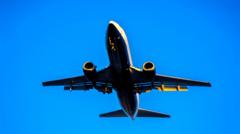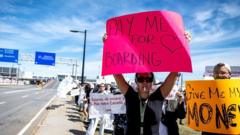Boeing workers have officially ended their strike, having secured a major pay raise and additional benefits following a seven-week walkout.
Despite earlier demands for a 40% pay increase, a majority of 59% accepted the proposed deal from the company, allowing them to start returning to their jobs soon. The strike had begun on September 13 and halted production, contributing to significant financial losses for Boeing, estimated at around $10 billion. Union leader Jon Holden emphasized that this negotiation victory reflects the workers’ quest for dignity and fair compensation.
Boeing's challenges extend beyond the strike, as reports indicate an operating loss of $4 billion in its commercial aircraft division for the recent quarter, prompting a drastic share sale initiative in attempts to stabilize finances. With workforce reductions looming and an ongoing fight for financial sustainability, Boeing aims to rebuild and restore its reputation in the aerospace sector, hoping to recapture the excellence that once defined the company.
Despite earlier demands for a 40% pay increase, a majority of 59% accepted the proposed deal from the company, allowing them to start returning to their jobs soon. The strike had begun on September 13 and halted production, contributing to significant financial losses for Boeing, estimated at around $10 billion. Union leader Jon Holden emphasized that this negotiation victory reflects the workers’ quest for dignity and fair compensation.
Boeing's challenges extend beyond the strike, as reports indicate an operating loss of $4 billion in its commercial aircraft division for the recent quarter, prompting a drastic share sale initiative in attempts to stabilize finances. With workforce reductions looming and an ongoing fight for financial sustainability, Boeing aims to rebuild and restore its reputation in the aerospace sector, hoping to recapture the excellence that once defined the company.




















